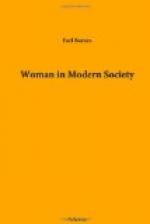In selecting representatives to carry out their will, women have certain obvious defects of temperament and training. Having been brought up for generations to judge men only as providers of sustenance and fathers of children, they must at first find it difficult to consider candidates impersonally. Still, their general morality and their standards of right are probably superior to those of men, and they are more intolerant of faults, and they find it harder to compromise on matters of character than do men. One can hardly believe that 1,700 women could be found among the respectable, church-going, American-born residents in any county of America, who would sell their votes, year after year, as that number of men voters has recently confessed to doing in Adams County, Ohio. In fact, Judge Blair says: “There was one class of the population which rebelled against the practice. It was the womanhood of Adams County, which had never become reconciled to the custom, and whose continual hostility has resulted finally, I hope, in its abolishment."[46]
[46] Seventeen Hundred Rural Vote-Sellers, by A.Z. Blair, McClure’s Magazine, November, 1911.
Of the need of women for the training which participation in political life gives there can be no doubt. Their lives have always been directly dependent upon other individuals, and they are prone to think in small details. Any training which extends the horizon of their interests and enables them to deal more largely with these details will fit them better for living in a world where industrial, business and social changes are so rapidly merging details in larger wholes. Experience in selecting candidates for public office would also do much to broaden women’s judgments of life, and would help to break down the pettiness which sometimes characterizes their personal relations.
In the case of women, the community has a double reason for desiring that they shall develop political judgments and become acquainted with political methods. It is not only that they may share in the general intelligence and carry their fair part of the political burdens; but they have become the teachers, both in homes and schools, of the oncoming generation of male voters. We no longer live in small communities where children can see the simple processes of government operating around them, but in a complex civilization where it must all be interpreted to them, and mainly by women. Many boys who complete our elementary schools never work a day under the direction of a man. In the homes, busy fathers increasingly turn over the training of children to their wives. How can these women train safe citizens for the future if they do not understand the processes involved well enough to use them themselves?




